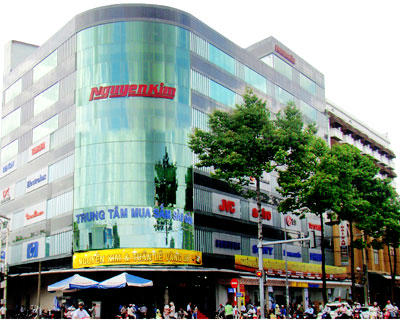Central Group’s window to dominate Vietnamese electronics retail market

Speaking to the press recently, Central Group’s representative did not deny the rumours about its purchase of Pico, but did not provide any details either. The deal is very likely to go through, however, as electronics retailing is traditionally tough, with high investment levels and a small profit margin.
If the deal is made, Central Group will have a distribution system that overarches the entirety of the country. Nguyen Kim currently has 21 stores. Its 2014 revenue was VND8.4 trillion ($394 million), while Pico has 24 stores with revenue in 2014 of VND3 trillion ($141 million) –which would make both of them valuable additions.
The worry that Central Group is going to take over the Vietnamese electronics retail market is further fuelled by the shrinking and closure of many Vietnamese companies in the field over the past five years. Wonderbuy, BestCarings and HomeOne closed in 2011, 2012, and 2013, respectively. Even Pico and Nguyen Kim were forced to close some of their stores due to market fluctuations. Most recently, Topcare closed all of its stores at the beginning of this year.
The scenario described above is unlikely to happen, according to general director of Mobile World Group (MWG) Tran Kinh Doanh, who claimed the market still had room for companies with suitable strategies.
The reason, according to Doanh, is that Central Group would only hold 15 per cent of the market, even with Nguyen Kim and Pico.
“Nguyen Kim held 27 per cent in 2010, but after a difficult period, especially when the market contracted by 20 per cent in 2012, its position has changed dramatically,” he explained. “The remaining 85 per cent is enough for domestic companies.”
Dien May Xanh, owned by MWG, currently has 31 stores and holds a 6 per cent market share. The company plans to operate between 60 and 70 stores by the end of 2015, and between 110 and 120 by the end of 2016.
The focus now lies on rural areas and smaller provinces. Doanh explained that traditional channels, namely small stores in rural areas, still made up the majority of sales in some areas of electronics. Therefore, the more convenient electronics supermarket model still has a chance to grow.
That is why Dien May Xanh is still heading north, even though this area already hosts competitive and established companies like Tran Anh and Pico.
Despite the plan for swift expansion, financial pressure will not be too high, according to Doanh, because Dien May Xanh chose to build its stores on 1,000 square metres, about one third of other supermarkets.
“Smaller stores open faster and the investment is not too high. If needed, we can also close quickly to change location. As of now, our profit margin is about 13 per cent, quite a bit higher than average,” he said.
According to market research company GfK, sales of consumer electronics were over VND116 trillion ($5.5 billion) in Vietnam last year, the second consecutive year that the sector achieved an annual growth rate of over 20 per cent.
The main engine of growth came from the telecommunications equipment segment, with the revenue of VND49.8 trillion ($2.34 billion) and an annual growth rate of 29.8 per cent. Sales of major and small domestic appliances grew by 13.5 per cent and 18.8 per cent to VND19.6 trillion ($920 million) and VND3.8 trillion ($178 million), respectively.
What the stars mean:
★ Poor ★ ★ Promising ★★★ Good ★★★★ Very good ★★★★★ Exceptional
Latest News
More News
- The generics industry: unlocking new growth drivers (February 04, 2026 | 17:39)
- Vietnam ready to increase purchases of US goods (February 04, 2026 | 15:55)
- Steel industry faces challenges in 2026 (February 03, 2026 | 17:20)
- State corporations poised to drive 2026 growth (February 03, 2026 | 13:58)
- Why high-tech talent will define Vietnam’s growth (February 02, 2026 | 10:47)
- FMCG resilience amid varying storms (February 02, 2026 | 10:00)
- Customs reforms strengthen business confidence, support trade growth (February 01, 2026 | 08:20)
- Vietnam and US to launch sixth trade negotiation round (January 30, 2026 | 15:19)
- Digital publishing emerges as key growth driver in Vietnam (January 30, 2026 | 10:59)
- EVN signs key contract for Tri An hydropower expansion (January 30, 2026 | 10:57)
















 Mobile Version
Mobile Version